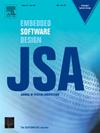RPC-MPKET:多用户车联网中基于位置的可撤销加密和密文等价性检验
IF 4.1
2区 计算机科学
Q1 COMPUTER SCIENCE, HARDWARE & ARCHITECTURE
引用次数: 0
摘要
车联网(IoV)系统可以提高城市交通效率。然而,基于云的车联网系统也带来了许多安全挑战。特别是,安全搜索车联网的加密传感器数据(例如,交通流量,GPS坐标)需要专门的可搜索加密(SE)方案来平衡可检索性和安全性。因此,SE已成为一个重要的研究领域。具有相等性测试的公钥加密(PKEET)提供了一种简单而有用的机制,它不仅可以加密数据,还允许对密文进行相等性测试。然而,现有的多用户PKEET技术无法实现授权撤销。一旦云服务器获得了授权陷阱门,它就可以在任何时候未经允许永久测试密文。为了适应基于云的多车车联网环境,我们提出了一种支持公共通道撤销的多用户公钥加密等式测试(RPC-MPKET)的新概念。在方案中引入了基于身份的加密的撤销机制。基于时间的私钥定期更新,支持公开通道传输,在保证隐私和安全的同时降低了建立成本。我们的方案满足选择密文攻击下的密文单向性(low - cca)和随机oracle模型中针对不同攻击者的密文不可分辨性(IND-CCA)。在效率方面,我们的方案通过Vandermonde矩阵的寻根方法实现加密、解密和测试,不需要双线性配对操作,提高了计算效率。最后,我们通过在云服务器上进行的一系列实验,证明了其在基于云的车联网环境中的实用性。本文章由计算机程序翻译,如有差异,请以英文原文为准。
RPC-MPKET: Location-based revocable encryption with ciphertext equality test for multi-user Internet of Vehicles
Internet of Vehicles (IoV) systems can improve urban traffic efficiency. However, cloud-based IoV systems also introduce numerous security challenges. In particular, securely searching IoV’s encrypted sensor data (e.g., traffic flows, GPS coordinates) demands specialized Searchable Encryption (SE) schemes to balance retrievability and security. Therefore, SE has become an important research area. Public Key Encryption with Equality Test (PKEET) offers a simple yet useful mechanism that not only encrypts data, but also allows equality tests on ciphertexts. However, existing multi-user PKEET techniques cannot achieve authorization revocation. Once a cloud server obtains the authorization trapdoor, it can permanently test ciphertext without permission at any time. In this paper, we introduce a new concept of Multi-User Public Key Encryption with Equality Test supporting Revocation in Public Channel (RPC-MPKET) to adapt to cloud-based multi-vehicle IoV environments. The revocation mechanism from identity-based encryption is introduced into our scheme. The time-based private key is updated periodically and supports public channel transmission, reducing the establishment cost while ensuring privacy and security. Our scheme satisfies ciphertext one-wayness under chosen ciphertext attack (OW-CCA) and ciphertext indistinguishability (IND-CCA) against different adversaries in the random oracle model. In terms of efficiency, our scheme achieves encryption, decryption, and testing through the root-finding method of Vandermonde matrices without bilinear pairing operations, enhancing computational efficiency. Finally, we demonstrate its practicality in a cloud-based vehicular network environment through a series of experiments conducted on cloud servers.
求助全文
通过发布文献求助,成功后即可免费获取论文全文。
去求助
来源期刊

Journal of Systems Architecture
工程技术-计算机:硬件
CiteScore
8.70
自引率
15.60%
发文量
226
审稿时长
46 days
期刊介绍:
The Journal of Systems Architecture: Embedded Software Design (JSA) is a journal covering all design and architectural aspects related to embedded systems and software. It ranges from the microarchitecture level via the system software level up to the application-specific architecture level. Aspects such as real-time systems, operating systems, FPGA programming, programming languages, communications (limited to analysis and the software stack), mobile systems, parallel and distributed architectures as well as additional subjects in the computer and system architecture area will fall within the scope of this journal. Technology will not be a main focus, but its use and relevance to particular designs will be. Case studies are welcome but must contribute more than just a design for a particular piece of software.
Design automation of such systems including methodologies, techniques and tools for their design as well as novel designs of software components fall within the scope of this journal. Novel applications that use embedded systems are also central in this journal. While hardware is not a part of this journal hardware/software co-design methods that consider interplay between software and hardware components with and emphasis on software are also relevant here.
 求助内容:
求助内容: 应助结果提醒方式:
应助结果提醒方式:


